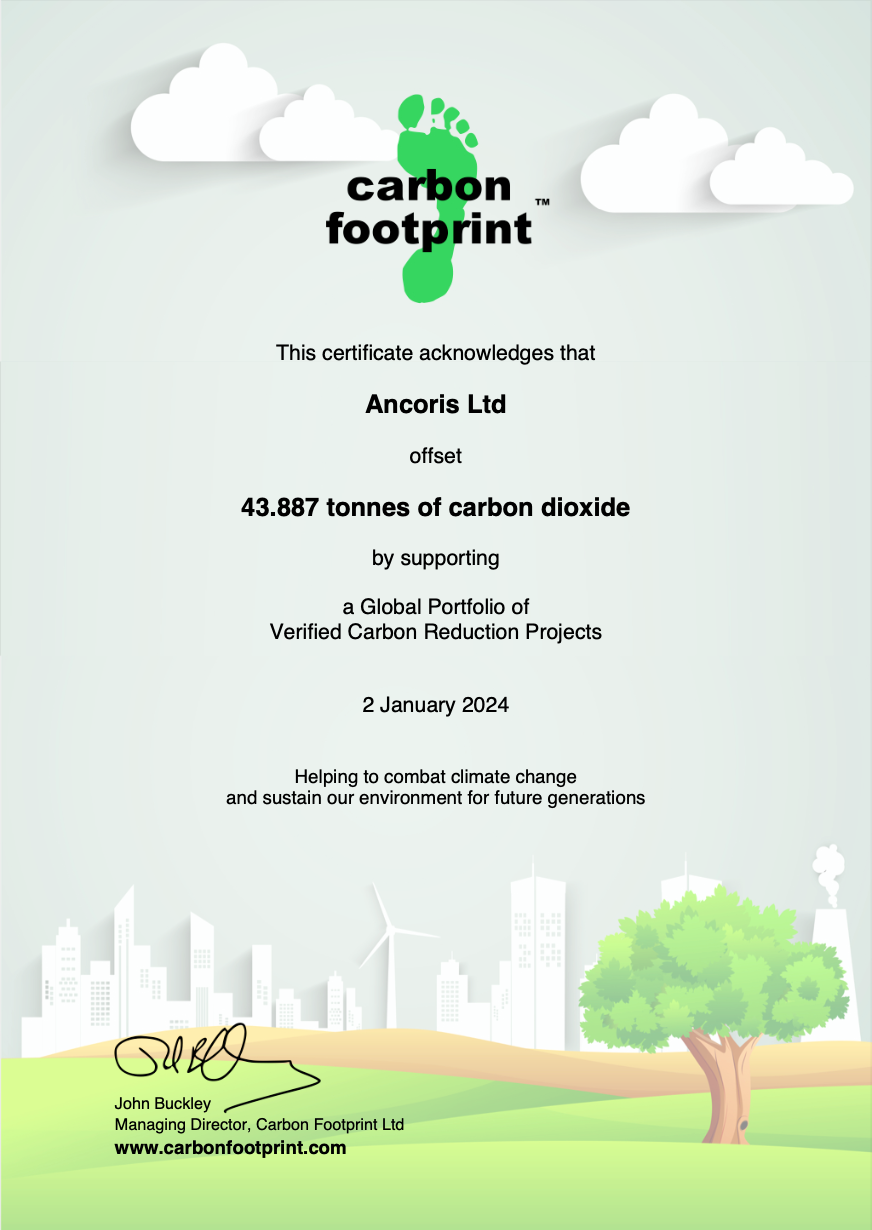Ancoris Carbon Reduction Plan
Ancoris is committed to achieving Net Zero emissions by 2030, and has been Carbon neutral since 2022.
Our Commitment to achieving Net Zero
Ancoris is committed to achieving Net Zero emissions by 2030, and has been Carbon neutral since 2022.
Baseline Emissions Footprint
Baseline emissions are a record of the greenhouse gases that have been produced in the past and were produced prior to the introduction of any strategies to reduce emissions. Baseline emissions are the reference point against which emissions reduction can be measured.
|
Baseline Year: 2019 / 20 |
|
|
Additional Details relating to the Baseline Emissions calculations. |
|
|
Our baseline emissions have been calculated on the basis of the headcount in our organisation in the year 1st Aug 2019 - 31st July 2020, using data previously collected at the time. Scope 3 sources include:
Note that the majority of staff are office based with no travel to customers, hence Scope 2 emissions exceed Scope 3. |
|
|
Baseline year emissions: 2019/20 |
|
|
EMISSIONS |
TOTAL (tCO2e) |
|
Scope 1 |
0 |
|
Scope 2 |
22.789 |
|
Scope 3 (Included Sources) |
19.135 |
|
Total Emissions |
41.924 |
With an average headcount of 41, this equates to emissions / employee of 1.023 tCO2e.
Current Emissions Reporting
Current emissions are detailed as below. Two areas have impacted the total emissions figures:
- Working from the office - there has been increased travel to visit clients and work from our offices, hence higher emissions.
- Increased headcount meaning increasing the potential for emissions.
|
Measurement Year: 2022/23 |
|
|
Additional Details relating to the Baseline Emissions calculations. |
|
|
Our current emissions have been calculated on the basis of the headcount in our organisation in the year 1st Aug 2022 - 31st July 2023 using data collected at the time. Scope 3 sources include:
Note that travel to the office and customers has increased, hence relatively high Scope 3 emissions compared to Scope 2. |
|
|
Current year emissions: |
|
|
EMISSIONS |
TOTAL (tCO2e) |
|
Scope 1 |
0 |
|
Scope 2 |
18.418 |
|
Scope 3 (Included Sources) |
25.469 |
|
Total Emissions |
43.887 |
With an average headcount of 102, this equates to emissions / employee of 0.430 tCO2e, a reduction of 57.92% from the baseline.
Summary details for our progress to date are:
|
Total Emissions (tCO2e) |
Average headcount |
Emissions per head (tCO2e) |
Change of Baseline |
|
|
2019/20 Baseline |
41.924 |
41 |
1.023 |
- |
|
2020/21 |
17.533 |
47 |
0.373 |
-63.52% |
|
2021/22 |
32.680 |
76 |
0.433 |
-57.67% |
|
2022/23 |
43.887 |
102 |
0.430 |
-57.92% |
Note: 2020/21 was the year of the COVID pandemic with practically 0 employee business travel; from 2021/22 increased travel to the office and client site took place as business practices returned towards normal.
Emissions Reduction Targets
In order to continue our progress to achieving Net Zero, we have adopted the following carbon reduction targets.
We are targeting carbon emissions that decrease over the next five years to 0.2 tCO2e PER HEAD by 2025. This is a reduction of 54% per head from today’s level, and a reduction of 80.5% from the baseline level.
In order to then achieve net zero, we will purchase appropriate Carbon offsets.
Carbon Reduction Projects
The following environmental management measures and projects have been completed or implemented since the 2019/20 baseline.
-
Take -on of more “green” accommodation space in London
-
Replacement of some IT requirement used by staff
-
Move of on-premise servers to the cloud
-
Increased use of Video and web based client and internal calls
-
Introduced new market facing “greenlab” service to identify changes customers can make, and applied the same principles ourselves.
-
Cycle to work and electric car scheme.
-
Introduction of a Flexible Working Policy.
The carbon emission reduction achieved by these schemes equate to approximately 5.5 tCO2e, or 0.58 tCO2e per team member - a reduction of a 62% reduction against the 2019 baseline.
Future Carbon Reduction Initiatives
In the future we hope to implement further measures such as:
-
Purchase of Carbon offsets to take us to Carbon Neutral status by the end of 2023
-
Increased focus on working with landlords of our offices to focus on Carbon reduction based operational initiatives
-
Intelligent heating and lighting systems
-
Use of renewable electricity
-
Availability of Electric vehicle charging stations
-
Refresh and use more efficient IT equipment
-
Review of expenses policy to potentially incentivise usage of electric vehicles and public transport
-
Support of initiatives encouraging staff to adopt personal “green” behaviours (Eg “Count us in” https://count-us-in.com/ )

Offset Certificate
Click on the following image to view the certificate in full.
Information on the projects we are supporting.